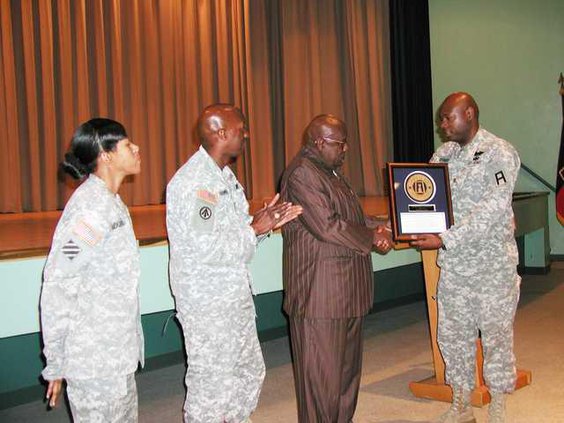Some Hinesville city officials remember what life was like before desegregation, many years before school children and service members would proudly observe Black History Month each
February.
District 3 Hinesville City Council Member David Anderson, a Vietnam veteran and Purple Heart recipient, spoke to the 188th Infantry Brigade at Fort Stewart’s Woodruff Theater on Thursday. Anderson said although much as changed and African Americans enjoy more freedom today than ever before, racism still exists and presents challenges for minority Americans to overcome.
"When I grew up in Mississippi, we didn’t have Black History Month; we had Black History Week back in the 1950s," Anderson told the brigade’s young soldiers.
The council member said Black History Week "began with slavery and ended with slavery" and little else. It wasn’t until Anderson got older and began to travel that he learned how rich and varied were the contributions made by African Americans to U.S. society, he said.
Learning more about such figures as Dr. Charles Drew, Booker T. Washington and Dr. Martin Luther King Jr. changed his perspective, he said.
Anderson said racism affects all Americans, citing such recent incidents as the controversial arrest of Harvard professor Henry Louis Gates Jr., and alleged racist comments made by Tea Party activists.
He said all Americans are interconnected, quoting a passage from a letter penned by King in a Birmingham, Ala., jail cell in 1963: "We are caught in an inescapable network of mutuality, tied in a single garment of destiny. Whatever affects one directly, affects all indirectly. Never again can we afford to live with the narrow, provincial ‘outside agitator’ idea. Anyone who lives inside the United States can never be considered an outsider anywhere within its bounds."
Anderson, along with Hinesville Mayor Pro Tem Charles Frasier and Mayor Jim Thomas, made strides toward equality here in Liberty County.
Anderson and Frasier both worked to get more African American candidates elected to city and county government.
"I was always involved in politics," Frasier said during a telephone interview this week.
Frasier said he was urged to run for office by State Rep. Al Williams, D-Midway, and his brother, the Rev. Henry Fraiser, a former mayor of Walthourville.
"The first couple of times I ran I didn’t get elected," Frasier said. "You have to want to get elected."
Frasier said when he was first elected to city council, council members were elected at-large. That is no longer the case, he said.
"Our city is so well integrated (today)," he said.
Frasier said he hopes young people of all backgrounds will follow his and others’ example and be inspired to do public service.
He added he and Williams helped change how juries are selected in Liberty County, as few blacks once served on juries. Frasier said former Liberty County Clerk of Court Robert Kitchens told him he was the first black jury foreman in Liberty County.
Thomas said African Americans also have made progress in the armed forces, as well as local government.
"When I joined the military, there had been only one African American general officer in the Army and there were very few officers of color in all of the military," Thomas said. "Today we are still under-represented in the officer corps; however, I feel that it is due to more opportunity in other sectors of our nation. Black History Month can serve as a period where we can reassess our accomplishments and plan for our future and the future of our count-
ry."

